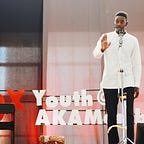Escaping the ‘Fences’ of Africa
“Some people build fences to keep people out, other’s build them to keep people in.”
‘Fences’ is a Hollywood film I recently watched for the second time. Partly because I was forced to, but also because I love Denzel Washington.
For me, any movie with Will Smith or Denzel Washington in a lead-role is a “must-watch”… and that’s not just because they’re both Black — though that is a major factor. But also because of how relatable their roles tend to be to me as an African man. The truth is, the Hollywood movies aren’t particularly good at telling the African narrative. So I, like many other Africans have had to ‘see myself’ in Black American stories. And though they are not always relatable, they are often close enough to spark my interest. I suppose that’s where my love for Will Smith and Denzel Washington stems from.
Anyway, Denzel’s Character in Fences portrays a black family man in 1950’s America. At face value, the movie could be considered completely foreign to me. Honestly, what does 1950’s America have to do with me as a Kenyan living in Nairobi?
My answer is; “Everything”.
There is a very strong metaphor in the film which I didn’t catch the first time. A metaphor that brings the movie closer to home. Denzel, though he is a black man in the 1950’s, reminds me of the many African father’s (or even mothers) I have come to know in my lifetime. The one trait that I have seen in many African parents, which is so reflective in Denzel Washington’s character in the movie, is this innate belief that they are being victimized.
Africans, just like black Americans, especially the older generations tend to believe that someone or something is always against them. They will blame the government, the environment, the past, anything and everything when things don’t happen the way they should. They will complain solely for the sake of complaining because to not complain is to have nothing to say at all. They will tell you stories of all they’ve have overcome, all the stuggles they went through, just to prove to you how hard it has been for them, and how hard it continues to be.
Truth is I don’t blame them.
When Denzel spoke of how the ‘white man’ took everything from him, how he couldn’t play baseball because of the ‘white man’ or how he’s been paying back a loan to the ‘white man’ for 15 years, it reminded me so fervently of my own family. Though we are thousands of miles away in a different continent altogether, our complaints and our grievances echo back and forth so much so that Denzel’s character could easily have been my father.
Let me back-track a little.
My parents and grandparents grew up in a world that wasn’t about options or possibilities. “Go to school, excel, get a job, work hard, get money and provide for your family,” that was it. They grew up in survival mode. I suppose when you’ve lived through the colonization of your people and the pillaging of your “possibilities”, it’s hard to see life through any other lens.
Whereas white families, or Euro-American kids may have grown up believing in mass opportunity, plush possibilities, and parents throwing around phrases like “you can be whoever you want to be”, for us Africans, it has been very different.
I, like many other Kenyan kids grew up in a ‘survival mentality household’. Study hard, finish school, so you can make money — that was ‘life’. Now I give credit to my parents for somehow escaping from that mentality a few years back, but today I see many African people, households, families, kids, still stuck in that same mentality. And I’m not talking about ‘poor’ people: poor people have to survive before they can dream big or see opportunities. It’s a different life when you’re are solely worried about where your next meal will come from. I have no bone to pick with the poor.
Instead, I’m talking about those of us who grew up like I did. The Africans who went to school; who had food on the table when they came home, and a fresh pair of socks to wear in the morning. The Africans who were afforded the possibility to “dream big” and “be whoever they wanted to be” — even though it was never explicitly said. It hurts me to see Africans who are oblivious to the opportunities that not only they have but their sons and daughters too. I want today’s Africans to strive for something greater than ‘survival’ even if we are used to a culture, society, or environment that dictates a different narrative to us.
My fear is that we, as Africans, though being “freed”, still struggle to see the possibilities that our ‘new world’ is giving us — the possibilities granted by the sacrifices of our ancestors.
The movie Fences spoke to me so deeply because Africans — be it parents, kids, culture, or communities — are much like Denzel Washington’s character.
We are building fences around ourselves. Not the types that keep others out, but the types that keep us and our people in. It is about time that we emancipated ourselves and grasped that we do not need to feel victimized. Opportunities and possibilities exist. The colonialists and the white men left a long time ago, we cannot take off the shackles on our ankles and strap them voluntarily on our minds.
There are no fences anymore. Only the ones we have built ourselves.
